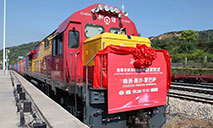Nuclear submarine deal impacts Australia's image, increases defense reliance on U.S., says scholar
SYDNEY, Sept. 24 (Xinhua) -- Australia's nuclear-powered submarine deal with the United States and Britain will shift the way in which some of its neighbors usually look upon it, and increase its defense reliance on the United States, said Allan Gyngell, a leading Australian scholar on international relations.
"It's certainly true that some of our neighbours will see this as an escalation of an armaments race in the region. So there's a lot of talking to be done," said Gyngell, national president of the Australian Institute of International Affairs, who had an extensive career in Australian international affairs.
In an exclusive interview with Xinhua, he said his concern about nuclear-powered submarines is that they might not be particularly relevant in the strategic environment Australia will be heading into.
Since the vehicles are enormously expensive, much more expensive than diesel submarines, the spending will require the Australian government to seriously think about where to distribute its resources more, whether in social policy, education, or defense expenditure, said Gyngell, who was the founding executive director of the Lowy Institute for International Policy from 2003 to 2009, and served as a senior advisor to then Australian Prime Minister Paul Keating between 1993 and 1996.
"This is such an expensive capability. I'm not sure how the rest of the region will respond to it," said the scholar.
As the author of the well-known bestseller the Fear of Abandonment, which analyzes the historical and psychological factors behind Australian diplomatic practices since 1942, Gyngell believes the similar psychological strain also applies to Australia's decision to join AUKUS, or the newly-established security pact among the United States, Britain and Australia, and the signing of the submarine deal.
He warned that the deal is likely to increase Australia's defense reliance on the United States. "My concern is that it does limit Australia's autonomy because unlike other parts of our defence force, these submarines could not be operated without the acquiescence of the United States as Australia simply won't have the capability to maintain and support the whole of the nuclear propulsion system."
"Australia's capacity to operate the nation's most expensive and powerful defence asset will always be subject to U.S. veto and the program will lead inevitably to deeper operational integration with the United States," Gyngell noted in a recent East Asia Forum article.
"It will be harder to disentangle our strategic commitments and our deep identification with the United States and Britain from our foreign policy interests. U.S. expectations of Australian support in almost any contingency, whether it involves China or not, will grow," he observed.
"So the agreement is a big Australian bet on the future of the United States, and at a more uncertain time in American politics than at almost any point in the history of the alliance," said the article.
Photos
Related Stories
- Biden, Macron hold phone call over submarine deal rift
- China expresses grave concern over U.S.-UK-Australia nuclear submarine cooperation
- Australia-U.S.-UK deal meets backlash from Europe amid nuclear proliferation worries
- China welcomes extension of nuclear monitoring agreement between Iran, IAEA: foreign ministry
- Iran's top leader insists U.S. lifts sanctions first to revive nuclear deal
- U.S. not involved in Iran nuclear facility incident: White House
Copyright © 2021 People's Daily Online. All Rights Reserved.










